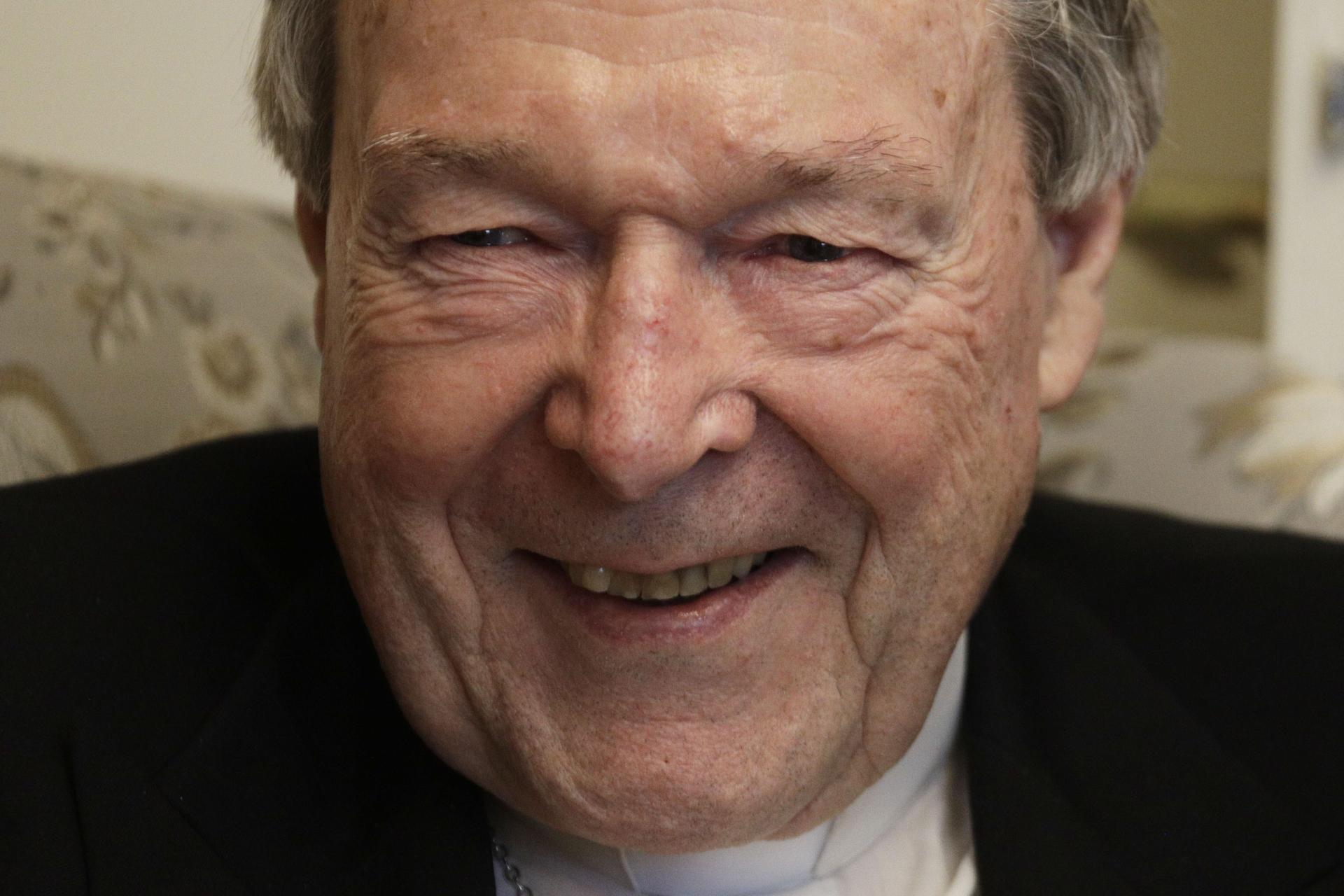ROME – Friends and foes alike are reflecting on the life and legacy of the late Cardinal George Pell of Australia after his death Tuesday, with many praising his deep faith and lifelong commitment to the church, and others criticizing his record on clerical abuse and his bullish tactics of public engagement.
A former top aide of Pope Francis charged with overseeing the Holy See’s financial reforms, who was charged with clerical sexual abuse and later acquitted after spending nearly 400 days behind bars, Pell died unexpectedly Tuesday night at Rome’s Salvator Mundi Hospital at the age of 81 due to complications after a hip surgery.
He will be flown back to his native Australia after his Vatican funeral and will be buried in St. Mary’s Cathedral in Sydney, where he served as archbishop for over a decade until his appointment as the Vatican’s first-ever Secretary for the Economy in 2014.
RELATED: Cardinal George Pell, a giant in more ways than one, dies at 81
Speaking to Crux, Australian Ambassador to the Holy See Chiara Porro echoed statements made by Australian Prime Minister Anthony Albanese expressing “our condolences to the Australian Catholic Church on behalf of the Australian government” for Pell’s passing.
Both Porro and Albanese spoke with Sydney Archbishop Anthony Fisher after news of Pell’s death broke.
“We’re liaising on the details of the funeral Mass to be held in Rome, and we’re providing consular assistance as required,” she said.
In the wake of Pell’s passing, there has been a swath of commentary on a man who was easily one of the Catholic Church’s most polarizing figures in the past half-century.
Fellow Australian prelates conveyed their sorrow at his passing, with Archbishop Peter Comensoli of Melbourne asking that “eternal light now be his, who so steadfastly believed in the God of Jesus Christ.”
Archbishop Anthony Fischer of Sydney, a Pell protégé, remembered him as “a fine priest, a good Christian soul (and) a man of courage and with a big heart, who trusted in divine providence” and who “fearlessly proclaimed the Gospel and worked to explain the teachings of the Church.”
“He spoke truth as he found it, however difficult or unpopular,” Fischer said, describing Pell as “a man of prayer, of deep Christian faith and a loving shepherd to his flock” whose final years were marked by his conviction for clerical sexual abuse and his subsequent acquittal, which Fisher said “gave us all an example of how to accept suffering with dignity and peace.”
Likewise, Bishop Richard Umbers, an auxiliary bishop for Sydney, hailed Pell as “larger than life,” calling him “a highly intelligent and well-read man who took a genuine interest in everyone around him. A pioneer for much good in Sydney, Australia, and the entire church.”
However, Pell was also remembered as a complicated man whose love for the church and its teachings was matched by an equally deep desire to fight for it, at times in what has been described as an overly-forceful and politically charged manner that ultimately created problems for himself, and drew criticism of the church.
Archbishop Mark Coleridge of Brisbane, who for years served as president of the Australian Catholic Bishops’ Conference, said the Catholic Church in Australia “has known few more extraordinary figures than George Pell,” and detailed his ecclesial achievements.
He referred to Pell’s reform attempts of Vatican finances and his brief imprisonment and subsequent exoneration, saying the “spiritual poise and strength” Pell demonstrated during that time “was extraordinary. It revealed a depth to George Pell that often went unrecognized.”
Yet Coleridge also acknowledged that Pell was seen as “big, powerful and heartless in the eyes of many,” saying this was because Pell, in the public arena, “presented himself self-consciously as the voice of the Catholic Church.”
“Those who didn’t know him thought Pell heartless and humorless, and his media persona could suggest this. Yet if George Pell had anything they were a good heart and a sense of humor. It was a pity that more of this didn’t show in his media appearances,” Coleridge said.
Coleridge said Pell knew he was flawed, and described him as “strong, even vehement in his faith, his convictions, his likes and dislikes,” and as someone who could be “a fierce opponent, unafraid to enter the battle.”
At times this could make Pell seem like “an ideological warrior, which did not serve him well. It certainly wasn’t George Pell at his best,” he said, saying Pell was always “a polarizing figure, stirring strongly contrasting reactions.”
Pell, he said, was someone whose deepest instincts “were those of a politician who thrived on opposition and conflict” and who held an at-times “apocalyptic view of the world seen as an arena where good and evil, life and death, light and darkness contended.”
“There wasn’t much middle ground for George Pell, not too many shades of grey,” Coleridge said, saying he had “unusual gifts of leadership,” and would have been a leader in any field or career path he chose.
“It will take time to assess his legacy in the Church in Australia, which will prove as complex, even as contradictory as the man himself,” Coleridge said. “For now, we give thanks for the gifts George Pell brought to us and the challenges he posed.”
Pell also had many critics, some of whom have recalled him as the heartless man of steel who was unmoved by the plight of victims of clerical sexual abuse, accusing him of not only negligence, but also coverup in his native Australia.
In a statement after Pell’s death was announced, the Survivors Network of those Abused by Priests (SNAP), asked Catholic leaders to “show compassion to abuse victims and betrayed Catholics” by refusing Pell a funeral service with full honors.
“Restraint would be appropriate unless the church hierarchy wants to deepen already deep wounds,” they said, voicing their belief that Pell’s “serious wrongdoing is already ignored and minimized by the church’s hierarchy.”
“Pell long kept silent about clergy sex crimes, was charged with abuse himself, and covered it all up. Pell manipulated the news to walk out of jail a free man. His true sentence begins with death,” they said.
Clare Leaney, chief executive of the In Good Faith Foundation, which works with survivors of institutional abuse, acknowledged that Pell’s death could be a difficult moment for survivors, saying in a statement that Pell for many was “a symbol of a system that repeatedly put the interests of the Catholic Church above the interest and safety of individuals.”
“While I acknowledge the passing of Cardinal Pell, my thoughts today are with every survivor of abuse from within the Catholic Church and for all those still seeking justice,” she said.
Similarly, the Australian Loud Fence Inc. survivor group, which places ribbons on fences in front of churches in honor of abuse victims, in a statement urged victims to “Stay safe” after Pell’s death by friends, family, and support services.
Other experts and advocates criticized the praise being heaped upon Pell, with lawyer Michael Magazanik, whose firm RightSide Legal has won significant settlements for abuse victims, quoted in the Sydney Morning Herald as saying, “The Olympian hypocrisy and double standards of the church hierarchy are on full display.”
“An outpouring of love for a man who at the very least turned a blind eye to massive child abuse, dreamt up a legal scheme which ripped off abuse survivors and personally seemed incapable of empathy with victims,” he said.
Victorian state government minister Steve Dimopoulos also spoke of the impact of Pell’s death on abuse victims, saying “today would be a very difficult day for the cardinal’s family and loved ones but also a very difficult for survivors and victims of child sexual abuse and their families and my thoughts are with them.”
Despite the controversy over his words and actions, Pell was also remembered for his academic accomplishments, with the Australian Catholic University (ACU) praising his role in Catholic education, noting that since the 1970s, he had held more than 20 prominent leadership positions in Catholic higher education in Australia.
In 2015, ACU awarded Pell an honorary doctorate for a lifetime of outstanding contribution to the Catholic Church both in Australia and internationally.
Martin Daubney, ACU Chancellor, said Pell was a central figure in both the formation and foundation of the university, saying that “from the time of its inception, Cardinal Pell maintained a deep and abiding interest in ACU.”
“The Church and its institutions in Australia and abroad are indebted to Cardinal Pell for his leadership and contribution to our community. His death will be felt by many in the Australian church and the wider community,” Daubney said.
In a statement following Pell’s passing, the Catholic Association recalled him as “both a vanguard of orthodoxy and a fearless reformer.”
Pell, they said, “was both unafraid to defend Church teaching to the world and unafraid to challenge the Church herself where reforms were needed. He suffered as a result.”
Ashley McGuire, Senior Fellow for The Catholic Association, said that Pell has now left this life for the next “with his name unambiguously cleared of the shameless attempts to besmirch it. He will be remembered for his courage before the Church and the world. He was a true lion of the Church.”
Pell was also remembered fondly by prominent Australian politicians, including former prime ministers Tony Abbot and John Howard.
In a statement, Abbot called Pell “a great leader” who was also “a committed defender of Catholic orthodoxy and a staunch advocate for the virtues of western civilization.”
“An ecclesiastical and cultural conservative, he attracted praise and blame from all the expected quarters,” he said, calling Pell’s imprisonment and subsequent acquittal “a modern form of crucifixion” and “a kind of living death,” as well as a testament to Pell’s own faith.
“In his own way, by dealing so equably with a monstrous allegation, he strikes me as a saint for our times…his reputation will grow and grow, he will become an inspiration for the ages,” Abbot said.
Howard echoed the sentiments, calling Pell “a strong and determined religious leader” who displayed “consistent courage in expressing Christian views in the public space.”
“His deep and compassionate faith sustained him during more than 400 days in prison for alleged crimes which many, me included, believed should never have been the subject of charges,” he said, saying Pell’s death is “a great loss to the intellectual and spiritual life of our country.”















